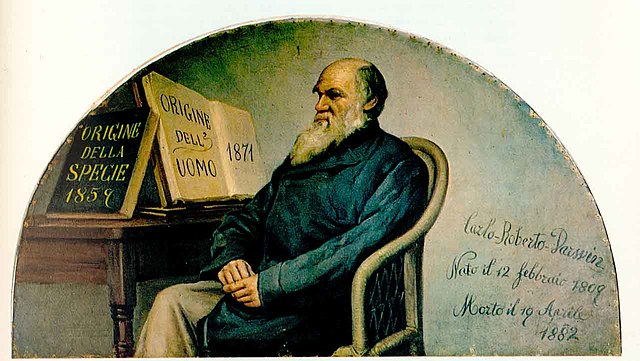
Italian panel depicting Charles Darwin, created ca. 1890, on display at the Turin Museum of Human Anatomy. Source: Wikimedia Commons.
By Karl S. Rosengren, Sarah K. Brem, E. Margaret Evans and Gale M. Sinatra
Today is Darwin’s birthday. It’s doubtful that any scientist would deny Darwin’s importance, that his work provides the field of biology with its core structure, by providing a beautiful, powerful mechanism to explain the diversity of form and function that we see all around us in the living world. But being of importance to one’s field is only one way we judge a scientist’s contributions. There is also the matter of how their work has changed lives all over the world, even of those who don’t know or necessarily care about their accomplishments. What has Darwin done for his fellow human beings? Why should they care about what he showed us, or want to learn what he had to teach?
Understanding evolution is challenging, for many reasons. We often point to the religious questions raised by his work as the cause of these difficulties, but there are many more. No creature decides to change their DNA, nor can a species foresee what they should become to survive, but it sure seems like they do. Evolution provides such elegant solutions to incredibly complex problems, it’s hard to see them as the product of random variation and selection. Even for people who lack religious convictions that make evolution discomforting, it’s hard to grasp the mechanisms of evolution. This difficulty arises out of developmental constraints that lead us to look for centralized, intentional agents when we make causal attributions. It comes out of the challenges inherent in altering our conceptions of the world and replacing one belief system with another, and out of the emotional reaction we have to facing the reality that we are not special or superior to our biological cousins, nor are we in control of the fate of our species in generations to come.
If we’re going to ask people to expend the time and effort it requires to wrap their heads around a idea like biological evolution, it seems as though there ought to be a really big payoff for all that work. So, what does learning about evolution get us?
We’ve asked this question to quite a few teachers, biologists, philosophers, and educational researchers along the course of several projects, the most extensive and recent being the one that led to the edited volume OUP will be putting out soon on teaching and learning about evolution. The reaction is almost always the same. First, there is the pause, as they blink, startled that anyone would be asking such a thing. Often they call upon evolution’s importance to science, and its beauty and elegance — who wouldn’t want to spend their time contemplating that? But if pushed back, and asked what practical value they could point to that would make the struggle of mastering these complex ideas worthwhile, they have a hard time coming up with an answer. The most common responses revolve around the (mis)use of antibiotics, and that people need to know that taking these drugs too often could cause real long-term harm. The second most popular argument is that people should understand the importance of biodiversity, how fragile species become when their gene pool dwindles and ecological balances are disrupted, and that being a part of nature — not above it — comes with responsibili


